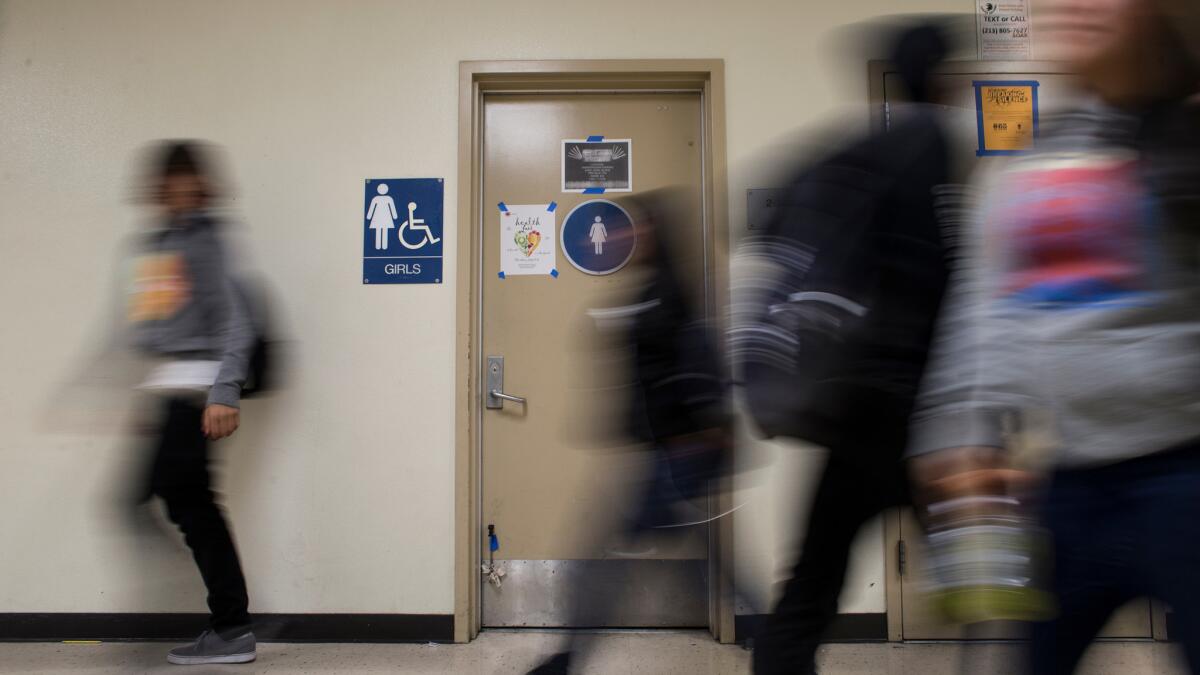Californians’ support of transgender bathroom access in schools is growing, poll shows

Californians’ support for transgender students being able to use bathrooms that match their gender identities is growing, especially among young people, a new USC Dornsife/Los Angeles Times poll has found.
As transgender restroom access is being debated across the country and 11 states are suing the federal government over the issue, most California voters back the state’s requirement that schools let students use the restrooms they prefer.
The law, AB 1266, took effect in 2014 and requires schools to let transgender students use bathrooms and locker rooms and play on the sports teams for the gender with which they identify, even if different from the gender they were assigned at birth.
Fifty-two percent of registered voters support the bathroom requirement, and 41% said they were opposed, the poll showed. [The rest said they did not know or refused to answer the question.]
Pollsters asked half of the participants solely about transgender student bathroom access and half about students’ access to both bathrooms and sports teams matching their gender identities. The results were similar.
Support for transgender student bathroom access has grown rapidly since voters were polled on the issue in 2013, when the law was being debated.
That year, Californians were about evenly split on the proposal, with 46% opposed and 43% in favor, with a 2.9% margin of error.
“The fact that Californians have been reassessing their opinions on this issue in such a short time period is exceptional,” said Dan Schnur, director of the Jesse M. Unruh Institute of Politics at USC. Similarly, attitudes shifted quickly in regard to same-sex marriage, he said, “but for the most part, public opinion on social and cultural issues like these changes much more slowly.”
See other stories from the poll »
Young people especially have quickly become more supportive of transgender rights while seniors have not.
Although 67% of California voters ages 18 to 29 supported bathroom access, only 38% of those over the age of 64 did so, the poll showed.
“There is a huge generational difference here,” said Ben Winston of Greenberg Quinlan Rosner Research, the Democratic half of the team of polling firms that conducted the survey.
Younger voters, pollsters said, were more likely to have grown up in a more diverse community than their parents or grandparents and were more likely to be supportive of measures that would support people they know.
Personally knowing a transgender person — a friend, family member, co-worker or other acquaintance — was a strong factor when it came to supporting student bathroom access.
Sixty-two percent of those who knew a transgender person supported the law, and 30% opposed it. Of those who told pollsters they did not know a transgender person, 47% opposed the law and 44% favored it.
Kris Hayashi, executive director of the Oakland-based Transgender Law Center, said personal relationships can change views because “most discriminatory policies are really based in ignorance and people’s lack of understanding about what it means to be transgender.”
When the Transgender Law Center tried to garner public support for the 2013 law, it made sure to have transgender people themselves doing the public speaking about it so people could put a face to the issue, Hayashi said.
Support for the law has grown rapidly among all racial and ethnic groups and among both men and women.
Differences fell clearly along party lines. Sixty-eight percent of Democrats supported the law and 25% opposed it, and support has grown since 2013.
Meanwhile, only 19% of Republicans supported the law this year, and 70% were opposed. Support has declined since 2013, when 23% of Republicans favored the proposal and 65% opposed it.
The poll showed three-quarters of Californians believe transgender people face discrimination. Though the perceived level of discrimination was less among Republicans, especially the most conservative ones, there was still a belief by most that discrimination exists.
But that does not necessarily translate to support for transgender bathroom accommodations in schools, said Randall Gutermuth, chief operating officer of the Republican polling firm American Viewpoint, part of the bipartisan team that conducted the survey.
“The concerns I’ve heard from Republicans is based largely on concerns of this being another example of a government overreach and the Obama administration forcing a policy on schools,” Gutermuth said in an e-mail.
The USC Dornsife/Los Angeles Times poll surveyed 1,500 registered state voters by telephone from May 19 to 31. The poll’s overall margin of sampling error is 2.9 percentage points.
Twitter: @haileybranson
ALSO:
Full results of the USC/LAT poll
LGBT divide grows as 11 states sue feds over transgender bathroom rule
More to Read
Get the L.A. Times Politics newsletter
Deeply reported insights into legislation, politics and policy from Sacramento, Washington and beyond. In your inbox three times per week.
You may occasionally receive promotional content from the Los Angeles Times.











